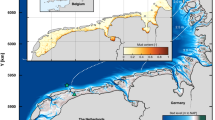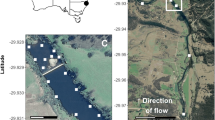Abstract
IT is probable that the lack of literature relating to intertidal mud ecology as compared with other intertidal habitats is due, in part, to the restrictions placed on movement by the softness of the substratum. Yonge1 reported that at Stolford, Bridgewater Bay, the shrimp fishermen, whose nets were secured on soft banks of mud, used a type of sledge or ‘mud-horse’, which they pushed in front of them. The sledge served the double purpose of preventing them from sinking deeply into the mud and of carrying back the catch. Barnett (personal communication) used mud shoes of his own design to aid movement.
This is a preview of subscription content, access via your institution
Access options
Subscribe to this journal
Receive 51 print issues and online access
$199.00 per year
only $3.90 per issue
Buy this article
- Purchase on Springer Link
- Instant access to full article PDF
Prices may be subject to local taxes which are calculated during checkout
Similar content being viewed by others
References
Yonge, C. M., The Sea Shore (Collins, London, 1949).
Author information
Authors and Affiliations
Rights and permissions
About this article
Cite this article
GEORGE, J. Equipment for Facilitating Movement on an Intertidal Mud-flat. Nature 200, 921–922 (1963). https://doi.org/10.1038/200921b0
Issue Date:
DOI: https://doi.org/10.1038/200921b0
This article is cited by
Comments
By submitting a comment you agree to abide by our Terms and Community Guidelines. If you find something abusive or that does not comply with our terms or guidelines please flag it as inappropriate.



